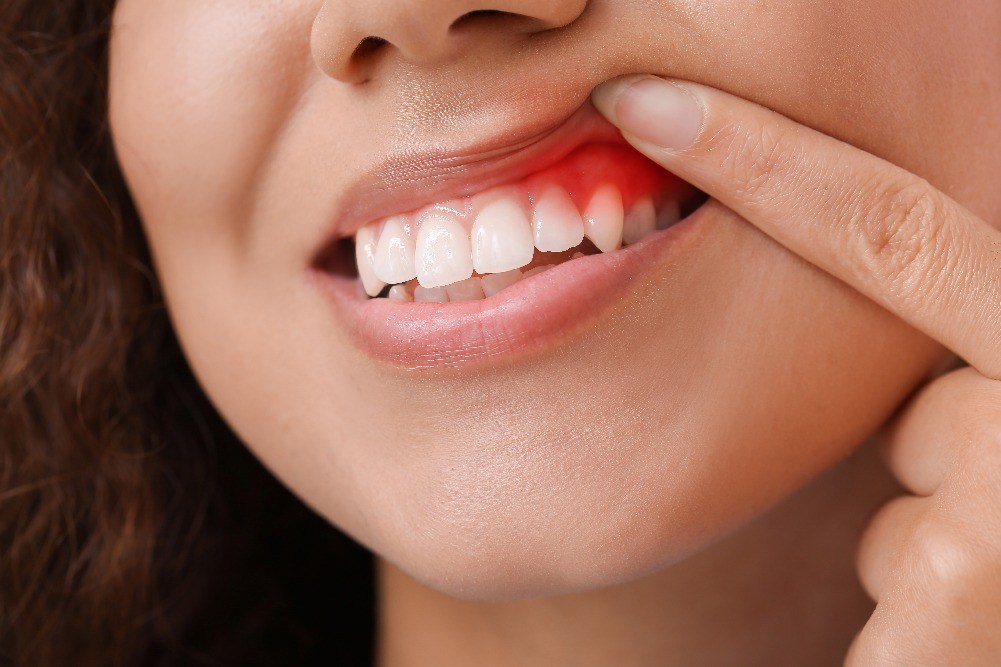As you explore ways to enhance your oral health, it's worth considering the pivotal role vitamins play in combating gum disease. You're likely familiar with Vitamin C's benefits for your immune system, but did you know it's also essential for healthy gums? Similarly, Vitamins D and E not only strengthen bone and tissue but also reduce inflammation in your gums. Now, consider the lesser-known heroes: Vitamin A promotes mucous membranes in the mouth, and Vitamin K is essential for blood clotting and bone health. But how exactly do these vitamins work together to prevent and fight gum disease? Stay tuned to uncover their synergistic effects on your oral wellness.
Key Takeaways
- Vitamin C strengthens gums, promotes collagen production, and reduces inflammation.
- Vitamin D supports calcium absorption and boosts immune function to fight gum disease.
- Vitamin A enhances tissue repair and maintains healthy mucous membranes.
- Vitamin E has antioxidant properties that protect and regenerate gum tissue.
- Vitamin K is crucial for bone health and supports strong teeth, aiding gum health.
Importance of Vitamins for Gums
Vitamins play a significant role in maintaining the health of your gums, helping to prevent and combat gum disease effectively. Without sufficient vitamins, you're at risk of developing vitamin D deficiency, which can weaken your immune system and reduce the calcium absorption essential for strong teeth. This can leave you vulnerable to gum disease, making it harder to manage right from your home.
Taking a closer look at B vitamins, they're indispensable warriors against inflammation in your gums. These vitamins, including thiamine and niacin, keep the tissues healthy and aid in the repair processes necessary when you're fighting gum disease. Plus, they don't just help your gums; they bolster your overall oral health by supporting nerve functions that enhance your mouth's healing ability.
Calcium plays a dual role. It not just fortifies your teeth, but also ensures that your jaw bone is strong enough to hold them securely. Without it, your teeth might just become wobbly castles in sand!
Lastly, vitamin K2 might not be the knight in shining armor you read about in fairy tales, but it's pretty close in the dental world. It activates proteins that direct calcium to where it's most needed, ensuring that your teeth and bones grow strong and resilient.
Role of Vitamin C
You'll find that Vitamin C is essential for strengthening your gums and maintaining the soft tissues in your mouth. This powerhouse vitamin not only promotes robust collagen production, which is important for the health of your gums, but it also acts as a potent antioxidant, aiding in the protection against gum disease.
Here are several key points about Vitamin C and its role in oral health:
- Collagen Production: Vitamin C is necessary for collagen synthesis, which helps maintain the integrity and resilience of your gums, reducing the risk of them pulling away from your teeth.
- Reduces Gum Inflammation: It helps in decreasing gum inflammation, which can prevent and treat swollen, tender gums.
- Prevents Bleeding Gums: By strengthening the blood vessels and tissues in your gums, Vitamin C helps prevent bleeding gums, a common symptom of gum disease.
- Rich Food Sources: Incorporating citrus fruits, like oranges and grapefruits, as well as other Vitamin C-rich foods such as kale, spinach, and berries, can boost your intake, supporting gum health.
Ensuring you're getting enough Vitamin C can play a significant role in keeping your gums healthy and disease-free.
Benefits of Vitamin D
Exploring the benefits of Vitamin D, it's clear that this nutrient is essential for maintaining strong teeth and preventing gum disease. You might not realize just how important Vitamin D is for your oral health, but it plays a significant role in bone and tooth mineralization, which directly impacts the strength and health of your gums.
Vitamin D deficiencies can lead to various oral health issues, including gum disease. Ensuring you're getting enough can make a big difference. Fortified foods, such as certain cereals and dairy products, are excellent sources to include in your diet. If you're not getting enough from food alone, Vitamin D supplements are an accessible option.
Here's a snapshot of how Vitamin D supports your oral health:
| Benefit | Description | Sources |
|---|---|---|
| Strong Teeth | Essential for tooth mineralization | Fortified foods, oily fish |
| Prevents Gum Disease | Anti-inflammatory properties reduce gum inflammation | Supplements, natural sunlight |
| Reduces Deficiencies | Supports overall oral wellness | Dairy products, supplements |
| Promotes Oral Health | Enhances calcium absorption for healthy teeth | Oily fish, fortified milk |
Vitamin A and Gum Health
To maintain excellent gum health, it's important to include Vitamin A in your diet, as it supports saliva production which cleans bacteria and aids in breaking down food. This essential vitamin not only keeps your gums and teeth healthy and strong but also helps prevent oral health disorders that could stem from a vitamin A deficiency.
Here's how Vitamin A plays a significant role in your oral health:
- Supports mucous membranes: Vitamin A is essential for maintaining the mucous barriers in your mouth that trap bacteria and viruses.
- Prevents dry mouth: Adequate Vitamin A ensures your salivary glands function properly, preventing dry mouth which can escalate gum disease.
- Enhances tissue repair: It aids in the quick repair and regeneration of gum tissues, keeping your gums robust.
- Strengthens tooth enamel: Vitamin A is involved in the formation and maintenance of dentin, a layer beneath your enamel, protecting your teeth from decay and erosion.
Making sure you're getting enough of this vitamin through diet or supplements can ward off a host of problems associated with vitamin A deficiency. So, keep your gums in tip-top shape by ensuring that Vitamin A is part of your daily regimen!
Vitamin E's Protective Effects
While Vitamin E is renowned for its antioxidant properties, it also plays an essential role in protecting and repairing your gums. This vitamin isn't just another supplement on your shelf; it's a vital ally in your fight against gum disease. Packed with the power to combat the damage caused by free radicals, Vitamin E guarantees your gum tissue isn't just surviving, but thriving.
But it doesn't stop there; it's also fighting inflammation, a common nemesis in gum disease. By reducing gum inflammation, Vitamin E not only soothes your gums but also aids in the regeneration of damaged tissues. Imagine it as a superhero, swooping in to heal and restore peace in the world of your mouth.
You'll find this mighty nutrient in foods like nuts, seeds, and leafy greens. Incorporating these into your diet isn't just a treat for your taste buds but a blessing for your gums. So, next time you're munching on a handful of almonds or blending a spinach smoothie, remember you're not just eating—you're arming your gums with the tools they need to fight back against gum disease. Keep up the good fight with Vitamin E by your side!
B Complex for Oral Wellness
B Complex vitamins, including B3, B12, and B2, are essential in preventing and treating oral health issues like stomatitis and gum irritation. You might not realize it, but these B vitamins play a vital role in maintaining your oral wellness. They help prevent common problems such as chapped lips, tongue inflammation, and the dreaded gum irritation that can make every meal a challenge.
Let's explore how you can boost your B vitamin intake effectively:
- Incorporate a variety of food sources: Include fish, red meat, spinach, legumes, and dairy products in your diet. These foods are not just nutritious; they're packed with the B vitamins important for gum health.
- Understand their benefits: B vitamins help in tissue repair and reducing inflammation, directly supporting gum health and overall oral wellness.
- Identify deficiency signs: Keep an eye out for dryness or microcracks in your mouth, as these can be indicators of B Complex deficiency.
- Focus on overall oral care: While B vitamins are essential, they work best when combined with good oral hygiene practices.
Daily Vitamin Recommendations
Now let's discuss the specific daily vitamin recommendations that can bolster your oral health regimen. For gum health, you'll want to focus on a few key nutrients known for their robust benefits. Firstly, make sure you're getting enough Vitamin C daily; it's important for tissue formation and maintaining the strength of your gums. You can find this powerhouse in citrus fruits, strawberries, and bell peppers.
Vitamin D should also be on your radar, as it's essential for immune function and helps your body fight off oral issues that could affect your gums. Foods like fatty fish, fortified dairy products, and sunlight exposure can help meet your needs.
Don't forget about Vitamin K, which is essential for strong bones and teeth. Green leafy vegetables like spinach and kale are great sources. To tackle oral issues directly, B vitamins are your allies, especially B3 and B12, which help soothe gum irritation and promote healing. They're abundant in meat, fish, and dairy products.
Lastly, include calcium in your diet to support tooth enamel and bone health. Dairy products, almonds, and broccoli are excellent choices. By incorporating these vitamins into your daily diet, you'll not only improve your oral health but also enhance your overall well-being.
Frequently Asked Questions
What Is the Best Vitamin for Gum Disease?
If you're wondering about the best vitamin for gum disease, Vitamin C should top your list. It's essential for collagen production, which keeps your gums strong. Plus, it fights inflammation and aids in healing your gum tissues. Don't forget to include plenty of citrus fruits, strawberries, and bell peppers in your diet to boost your Vitamin C intake and keep those gums in tip-top shape!
What Vitamin Deficiency Causes Gum Disease?
Deficiencies in vitamins like a garden without water can leave your gums vulnerable. Lacking Vitamin C often leads to inflamed and bleeding gums. Insufficient Vitamin D can increase gum disease risks due to poor calcium absorption. Low levels of Vitamin B complex can exacerbate oral health issues, contributing to gum disease. It's important to maintain a balanced intake of these vitamins to keep your gums as resilient as a fortified castle.
What Is the Best Thing to Reverse Gum Disease?
To effectively reverse gum disease, you'll need to combine good oral hygiene practices with regular dental visits. Brushing and flossing daily, alongside professional cleanings, are essential. Additionally, maintaining a balanced diet rich in essential vitamins will support your gum health. Don't forget, catching issues early through regular check-ups can prevent serious problems down the line. It's all about keeping those pearly whites healthy and your gums in top shape!
What Mineral Stops Gum Disease?
Did you know that calcium is your secret weapon against gum disease? It strengthens tooth enamel and supports overall oral health, reducing the risk of inflammation, bleeding, and progression of gum disease. By including calcium-rich foods like dairy, leafy greens, and nuts in your diet, you're not just nurturing your bones but also fortifying your gums. So, why not give your gums the boost they need with a calcium-packed snack?
Conclusion
Now you're armed with knowledge about the powerhouse vitamins essential for battling gum disease—Vitamin C, D, E, A, and K. Just as a knight needs armor in battle, your gums need these vitamins to fight off the relentless foes of inflammation and decay. Don't just eat mindlessly; choose your meals like you're picking your best warriors—rich in these essential nutrients. Remember, a daily dose of these champions can be your gums' best defense!

